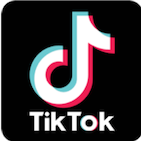Jerry Altman of Adecco USA in Tallahassee, Florida sent me an email in response to my Newsletter on 5G saying that our readers should be aware of the warning by the National Oceanic and Atmospheric Administration (NOAA) that 5G may force weather forecasting back several decades. According to studies by NASA and NOAA, the current plan would reduce data collected on “passive microwaves” by 77% and degrade the forecast skill by up to 30% taking us back to somewhere around the 1980s. This would result in the reduction of the hurricane track forecast time by roughly two to three days. Great information Jerry. Thank you.
TikTok app allows users to post short videos of themselves lip-synching to music, doing makeup tutorials, performing synchronized dances or acting out comedic skits.

TikTok is a breakout platform featuring short-form videos, following Vine, which shut down in early 2017 and Dubsmash and TikTok’s previous iteration Musical.ly. In November 2017, the $75 billion Chinese media company ByteDance bought Musical.ly with the intent of folding its 60 million users in the U.S. and Europe into its own successful video app, TikTok (known as Douyin in China).
The new global TikTok app took off in 2018, rising to the top of Apple’s App Store and racking up a record 3.8 million first-time downloads in October. Teenagers drove its success in the U.S., and its most popular videos began to spill onto other platforms like Twitter, YouTube and Instagram. TikTok allows artists to get their music in front of potential fans while bypassing the traditional gatekeepers. It offers a platform that is creative, collaborative, global and unique.
TikTok comes at a time when streaming revenue has surpassed physical sales but overall revenue remains soft because of how much music is available free online. Most musicians today must rely on touring and merchandise to make a living. Streaming generates minimal revenue.
On TikTok artists who have seen their songs get a platform but little money. TikTok gives you content based solely on an algorithm powered by artificial intelligence, displaying the most viral and fun videos. TikTok, did not invent the lip-sync comedy that’s been popular for 60 years. But the platform made it simple to both consume and take part. TikTok has a huge database of songs, you can click on a song and use it immediately.
TikTok’s biggest success is Lil Nas X. The 20-year-old was a college dropout sleeping on his sister’s floor when he started promoting his country-rap song “Old Town Road” through memes on Twitter and Instagram. Then it broke on TikTok, with creators using it in their videos. Record labels got infierce bidding war and Lil Nas X signed with Columbia Records. A remix featuring Billy Ray Cyrus sits at No. 1 on the Billboard Hot 100.
But the world’s most valuable startup profiting off rising musicians has both performers and music legal experts worried. TikTok secures licensing deals with different rights holders like labels to publishing platforms like TuneCore–and pays to use their catalogs. The money then theoretically gets distributed back to the songwriters in the form of royalties. But artists without a deal with TikTok have not been paid by the platform at all, even if their song becomes a monster.
Last year, Congress passed the Music Modernization Act, which made it easier for artists to be paid for streams. But because TikTok isn’t a streaming service, the act doesn’t apply, and in part because of TikTok’s relative newness, the music industry has yet to come together to tackle its monetization issues. Songwriters, music publishers and owners of recorded music are having their music basically stolen with no incentive for the TikTok’s of the world to do anything about it. They are destroying the value of their music.
My best job was being a musician on TikTok, but eventually I found I wasn’t noteworthy
